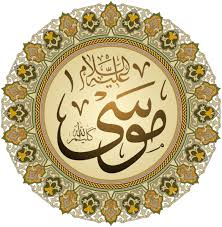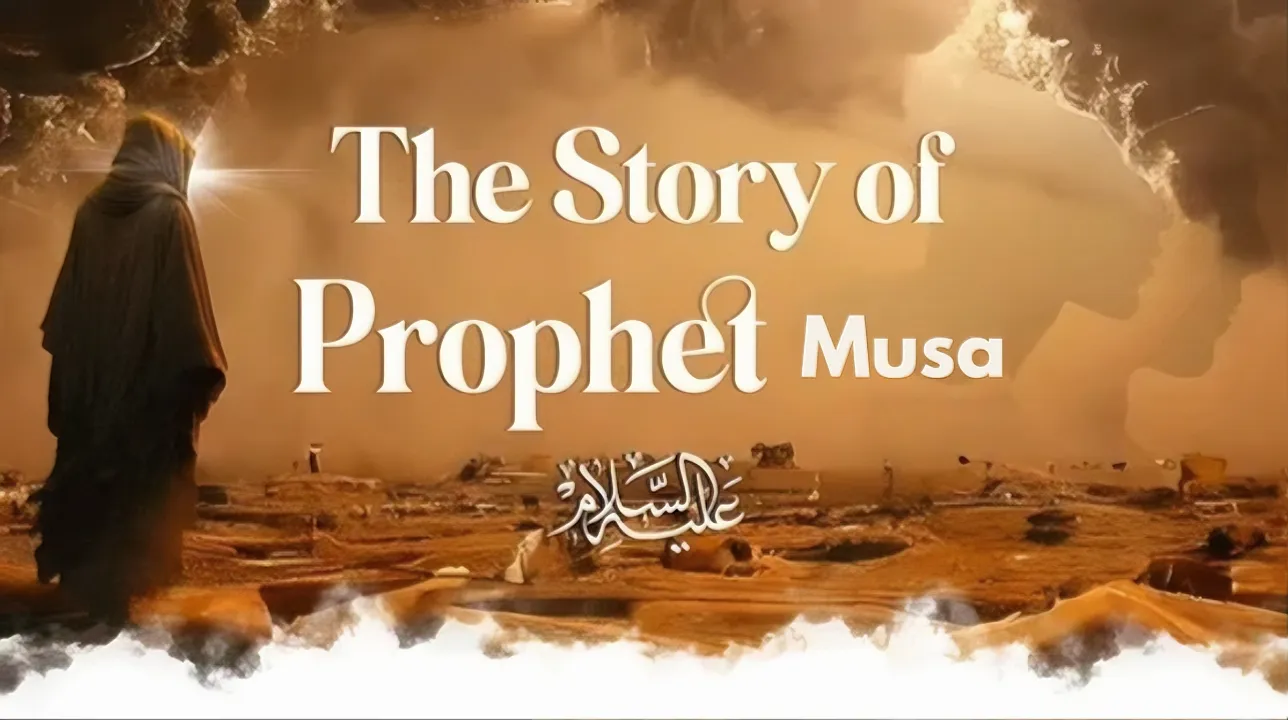Last Updated on May 20, 2025 by Arabian Tongue Team
the story of Prophet Musa (Moses), peace be upon him, is one of the most frequently mentioned prophets in the Qur’an and holds a significant position in Islamic, Christian, and Jewish traditions. His story is one of struggle, patience, miracles, leadership, and faith in Allah. Born in a time of oppression, Musa’s life journey highlights the eternal conflict between tyranny and justice, disbelief and faith, and fear and courage. This article presents a detailed account of his life as narrated in the Qur’an, supported by Islamic tradition.
Birth and Early Life

Musa was born in Egypt during a time when Pharaoh, the ruler of Egypt, had ordered the killing of every newborn Israelite male. The Israelites (Bani Israel) were enslaved and persecuted under Pharaoh’s harsh rule. Fearing for her newborn son, Musa’s mother was inspired by Allah to place her baby in a basket and cast him into the Nile River, trusting in Allah’s promise to return her son and make him a prophet.
By the will of Allah, the basket floated to the palace of Pharaoh, where Musa was found and adopted by Pharaoh’s wife, Asiya, who loved him deeply and convinced Pharaoh to keep the child. Allah caused Musa’s biological mother to become his wet nurse, reuniting her with her son in a miraculous way.
Read more: the story of prophet yusef
The Story Of Prophet Musa
Musa grew up in Pharaoh’s palace as a prince, unaware of his prophetic mission. As he matured, he became aware of the injustices committed against the Israelites. One day, he saw an Egyptian man beating an Israelite. Trying to intervene, Musa accidentally killed the Egyptian. Fearing the consequences, Musa fled Egypt and journeyed to the land of Madyan.
In Madyan, Musa met two women struggling to water their sheep. He helped them and later met their father, Prophet Shu’ayb (Jethro), who offered one of his daughters in marriage to Musa in return for ten years of service. Musa accepted and lived in Madyan during this period of growth and spiritual preparation.
The Divine Call and the Burning Bush
After completing his term, Musa began his journey back to Egypt with his family. On the way, near Mount Sinai, he saw a fire and went to investigate. There, Allah spoke to him directly from a burning bush — a moment known as Musa’s first direct communication with Allah.
Allah commanded Musa to go to Pharaoh and demand the release of the Israelites. Musa, fearing Pharaoh’s wrath and his own speech impediment, asked Allah to send his brother, Harun (Aaron), with him as a helper. Allah granted this request and armed Musa with two miracles: his staff turning into a snake and his hand glowing brightly when placed under his arm.
Read about: The Story of prophet ismael
Confrontation with Pharaoh
Musa and Harun went to Pharaoh, delivering Allah’s message. They called on him to abandon his tyranny and worship the One True God. Pharaoh mocked Musa, accused him of sorcery, and challenged him in front of his court.
To discredit Musa, Pharaoh organized a public contest between Musa and the magicians of Egypt. The magicians threw their ropes, which appeared as moving snakes through illusion. But when Musa cast his staff, by Allah’s will, it turned into a real serpent and devoured their illusions. Recognizing the truth, the magicians fell in prostration, declaring belief in the God of Musa and Harun.
Pharaoh, enraged, ordered the magicians to be killed. Despite the threat, they remained firm in their faith, becoming among the first believers of Musa’s message.
The Plagues and the Exodus
Pharaoh refused to free the Israelites, so Allah sent a series of plagues upon Egypt: floods, locusts, lice, frogs, and blood. Each time, Pharaoh begged Musa to pray for the removal of the plague, promising to release the Israelites. But once the calamity was lifted, Pharaoh broke his promise.
Finally, Allah commanded Musa to lead the Israelites out of Egypt at night. Pharaoh pursued them with his army. As they reached the Red Sea, the Israelites panicked, believing they would be caught. But Musa reassured them of Allah’s support. Allah instructed Musa to strike the sea with his staff, and the sea miraculously parted, creating a path for them.
When Pharaoh and his army followed, the sea closed upon them, drowning them. Pharaoh tried to proclaim belief at the last moment, but Allah did not accept his repentance, saying it was too late. Thus, the Israelites were saved, and Pharaoh was destroyed.
Recommend: The story of prophet ibrahim
The Covenant at Mount Sinai
After the exodus, Musa led the Israelites through the desert toward the Promised Land. During their journey, they were provided with miraculous food (manna and quails) and water from a rock Musa struck with his staff.
At Mount Sinai, Allah gave Musa the Torah (Tawrat), containing divine laws for the Israelites. Musa spent 40 days in communion with Allah. In his absence, some Israelites, influenced by Samiri, created and worshipped a golden calf. When Musa returned and saw their idol worship, he was deeply angered and disappointed.
Musa reminded them of Allah’s favors and punished the wrongdoers. He then prayed for forgiveness on behalf of his people, and Allah forgave those who repented.
The Challenges of Leadership
Despite being saved from slavery and witnessing countless miracles, the Israelites were often ungrateful and disobedient. When Allah ordered them to enter the Holy Land, they refused out of fear, claiming there were powerful people there. Due to their cowardice and lack of faith, Allah punished them to wander in the desert for 40 years.
During this time, Musa continued to guide them, teach them, and judge between them. He appointed Harun to assist him in leadership. Harun later died, followed by Musa before the Israelites reached the Promised Land.
FAQs
Why is Prophet Musa mentioned so frequently in the Qur'an?
Prophet Musa is mentioned more than any other prophet in the Qur'an (over 130 times) because his story embodies key lessons in faith, patience, leadership, and dealing with tyranny. His journey reflects the challenges faced by prophets and the importance of obedience to Allah.
What miracles did Prophet Musa perform by Allah’s will?
Musa performed several miracles, including his staff turning into a snake, his hand glowing with light, parting the Red Sea, bringing forth water from a rock, and surviving Pharaoh's tyranny. These miracles affirmed his prophethood and strengthened the faith of the believers.
How did Pharaoh die, and why wasn't his last-minute belief accepted?
Pharaoh drowned in the Red Sea while pursuing Musa and the Israelites. He tried to declare faith as he was dying, but it was rejected because belief at the moment of death, when faced with the reality of punishment, is not genuine repentance in Islam.
Why did the Israelites worship the golden calf despite witnessing so many miracles?
Despite the clear signs and miracles, some Israelites were influenced by past pagan practices and the whisperings of Samiri, who led them astray. Their action shows that miracles alone do not guarantee faith; internal sincerity and discipline are necessary.
Did Prophet Musa enter the Promised Land?
No, Prophet Musa passed away before entering the Promised Land. Because of the disobedience and lack of faith of the Israelites, Allah decreed that their entry would be delayed, and Musa died during the period of wandering in the desert.
Conclusion
The story of Prophet Musa is a rich tapestry of divine guidance, human struggle, miraculous intervention, and unwavering faith. From his miraculous rescue as an infant to his courageous confrontation with Pharaoh, and his long journey guiding a stubborn people, Musa exemplifies the qualities of patience, leadership, and devotion to Allah.
His life teaches that truth will always prevail over falsehood, no matter how powerful the oppressors may seem. It also serves as a reminder that faith must be accompanied by trust in Allah and adherence to His commands. Prophet Musa remains a timeless symbol of hope for all who face hardship and tyranny in pursuit of justice and freedom.

